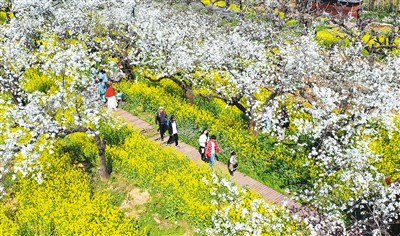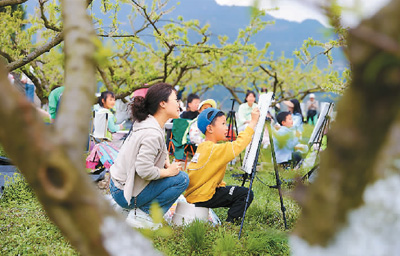Eco-tourism injects vitality into beautiful, harmonious countryside
China's Ministry of Agriculture and Rural Affairs recently held a spring-themed leisure tourism promotion event for rural areas, unveiling 60 tourism routes and 185 scenic spots.
Rural areas have become popular domestic destinations for Chinese tourists. During the three-day Qingming Festival holiday that ended on April 6, rural travel orders skyrocketed 239 percent year on year, according to Chinese online travel agency Ctrip.

People enjoy pear blossoms in Huaibei city, east China's Anhui Province. [Photo/Feng Shufeng]
In recent years, China's rural tourism has entered a fast lane of development. Regions across the country have continuously improved infrastructure such as roads, power supply, water supply, and communications in rural areas, and also built rural book houses, reading rooms, activity rooms, rural stages, and other cultural facilities. They have also developed various tourism forms, giving rural tourism a deeper significance.
Rural areas have once again become places that tourists are eager to visit, as they can appreciate pristine natural landscapes while feeling the vibrant atmosphere through rural tourism.
Thanks to the integration of ecology and tourism in many places across China, an increasing number of people who previously worked outside their hometowns have returned to start businesses.
For example, several tea-themed tourist destinations, including Hanzhong and Ankang cities in the southern part of northwest China's Shaanxi Province, have rolled out tourism products related to picking tea leaves, allowing tourists to experience the fun of supervised tea picking and the charm of tea culture.
Jingmai Mountain in Lancang Lahu Autonomous County, Pu'er, southwest China's Yunnan Province is entering the spring tea harvest season. The Cultural Landscape of Old Tea Forests of Jingmai Mountain was inscribed on the UNESCO World Heritage List in 2023.

Kids draw pictures at a plum base in southwest China's Chongqing Municipality. [Photo/Yang Min]
The tea industry has become a sector that now brings wealth to people. This year, the county's dry raw tea output is expected to reach 35,000 tonnes, with an estimated output value exceeding 8 billion yuan (about $1.1 billion).
In Changdai village, Hangzhou, capital of east China's Zhejiang Province, tea has brought wealth to both local tea farmers and tea-picking workers from other regions. Located in the core zone of the protected origin of West Lake Longjing tea, the village boasts 1,496 mu (about 99.73 hectares) of tea gardens. At present, there are 360 tea farming households in the village. During this year’s spring tea harvest season, over 3,000 workers came to the village to pick tea leaves.
A good environment has become the "golden business card" for rural development. Villagers have paid more attention to ecological conservation and environmental governance, contributing to the building of a beautiful countryside with a sound ecology, wealthy people, and thriving industries.
Tourists can enjoy blooming peach blossoms, fly kites, and savor peach flower wine at an ecological garden in Shuipoya village, Wenshang county, east China's Shandong Province.
Once a dirty and disorderly place, the ecological garden has now become a popular tourism destination after the village's efforts to improve road and watercourse conditions, promote large-scale peach planting, and combine sightseeing and agriculture.
The village is just one vivid example of a development path characterized by a sound ecology, thriving industries, and wealthy people in the county.
























